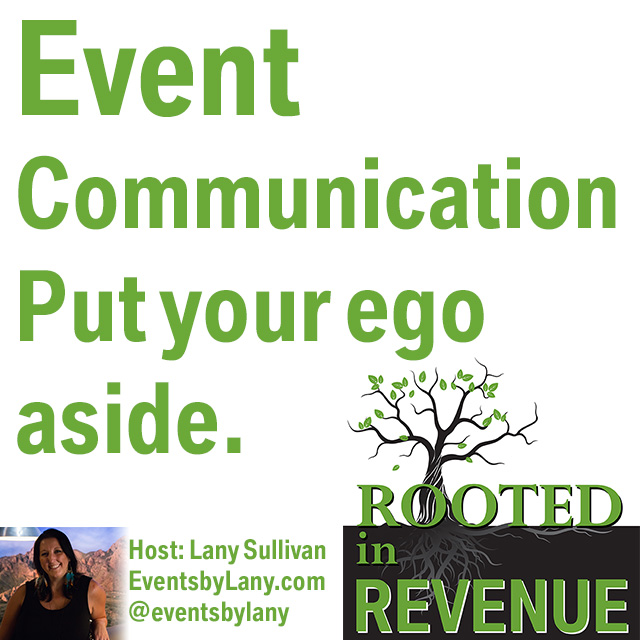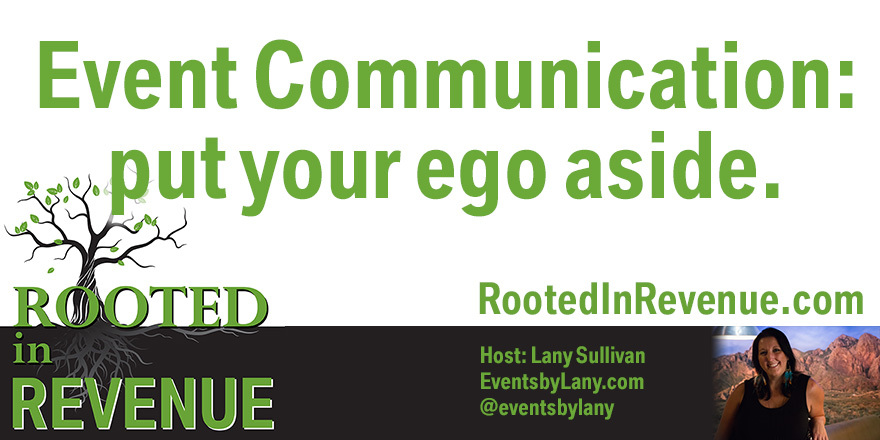
Thursday Apr 26, 2018
Event Communication - Put your ego aside

Communication can sometimes be the hardest part of an event. The details are manageable, but sometimes the people involved are not. You will deal with a wealth of personalities, opinions and experiences that you may not enjoy engaging with. Put your ego aside and listen first. Digest what is being said to you and then make sure that you clearly and concisely craft a response that does not incite drama.
Communication can be a challenge no matter what you are doing in life or business, but let's focus on the event application of it.
Why is communication important for an event creator, planner, founder or host?
- It leaves no room for questions
- It eliminate worry and concerns
- It creates an open dialogue
- It creates clarity
Communication these days comes in many forms; email, calls, text messages, Facebook messages, Google Hangouts, Skype, Twitter Direct Messages and even public posts on social. It's a wonder we can even keep our communication clear these days. As an event planner, I work hard to keep my communication with my clients down to just a couple of vices when it comes to communicating about an event. Typically, email is the first form of communication, then calls, text messages and somehow Facebook messages get thrown into the mix (even though I still hate Facebook). The more complex an event, the simpler your form of communication should be. There are so many elements to manage and execute on during an event, you want to make sure that your communication is clear for all parties involved.
Clear communication really helps to eliminate the stress, burden and annoyance of someone saying "I didn't know". Trust me on that one. Usually I am running more than one event at a time, so I am dealing with different personalities, opinions, expectations, etc, etc and I have to be able to navigate them without getting myself into trouble. We're all human, but sometimes we forget and take our frustration out on the person delivering the message not thinking about the ramifications of our form of communication, tone or words.
Let's talk about events that I have run in the past. When confirming event details with speakers, I prefer a very clear and detailed form of email that lays out all their needs, deadlines, expectations, reservations, etc. Sometimes these emails can be long, but I make sure that they are extremely clear. I even have it proof read by someone not on my team (who would know all of the details) to make sure that it makes sense to them (as someone not in the know). I make adjustments on clarity where necessary and then shoot the email out to the speakers.
Would it shock you to know that more often than not 20-30% of the responses ask questions regarding items that I clearly laid out in my email?
Probably not. It doesn't surprise me either.
We move through our days too quickly. We skim emails. We scan for what we recognize and then we shoot from the hip. We're all guilty of it. I've done it myself. Now, what if we as event planners, event creators, speakers, vendors and all other active participants slowed down for a hot minute and read through the email before jumping all over the messenger? That would be quite a novel idea.
Let's flip the script a bit. I was invited to speak at an online conference. I spoke with the host about the details and said I was definitely interested. That was the last I heard about it until about 15 days before the conference when I reached back out again to the host. I was getting ready to finalize my content and I wanted to make sure that my presentation and delivery was what they were looking for. After about 45 minutes on the phone and 20 questions from me to the host, I felt I had a good understanding of what they wanted. A week later I received a message from the host asking me when I could record. I was confused because nowhere in our previous conversations had they mentioned me recording my presentation with them. At this point I was already pre-recording my content and informed them so. They agreed to let me move forward with the pre-recorded presentation. My team finished compiling the presentation and I delivered it via email to the host. Wouldn't you know, I received an email in response that informed me that I did not use the event branded template.
Hhhmmmm.......
Again, nowhere in our conversations did a branded template ever come up. Might I remind you as well, that up until that point I had still not received any details about the event, expectations, deliverables, timing, etc. NOTHING. I even had to ask for an affiliate link after the host complained that no speakers had been promoting the event. I informed the host that I would be happy to promote it, but I never received an affiliate link as verbally promised.
I promoted the heck out the event, but I never saw the host promote the event until 4-5 days prior to it going live. Now, the day before the event I received an email geared toward participants informing them about all the good stuff happening during the live conference. It said that the speakers would be showing up live during their sessions. Guess who never received an email from the host letting her know when her session was going to be live so that she could show up and serve the audience properly. You guessed it... This girl.
Needless to say, the communication on that event is a prime example of what not to do as a host/event creator. Please take care of your speakers and communicate with them actively and often. They want to show up and do their best for you and your tribe.
I was recently chatting with another event planner and we were swapping stories as we all do about specific scenarios that we run into with clients. She shared with me that she resigned from a client because one of the major issues was communication. The client doesn’t like to repeat herself and gets upset when she has too. Understandable. Here’s the glitch. The client doesn’t give clear instructions in the first place. She’s all over the board and so when her team returns to her to get said clarification she loses it.
Events are hard enough as it is, so the client who doesn’t communicate wants, needs and desires clearly throws a monkey wrench into the whole thing.
Here’s the thing, to create something amazing and to keep the entire team, vendors and venue on task and on the same page this communication thing has to be worked out.
If someone from your team comes to you and doesn’t understand your instructions or the vendor is not clear or g-d forbid the venue is not clear; DO NOT BITE THEIR HEAD OFF. Pause. Breathe. Take responsibility. Ask them what they did not understand. Repeat what they said to you, so they know that you heard them (and didn’t lose your shit). State your instructions as clearly as you can and then ask if they understand or have any questions that you can clarify.
This is common sense, but we are not taking the time to communicate.
No comments yet. Be the first to say something!